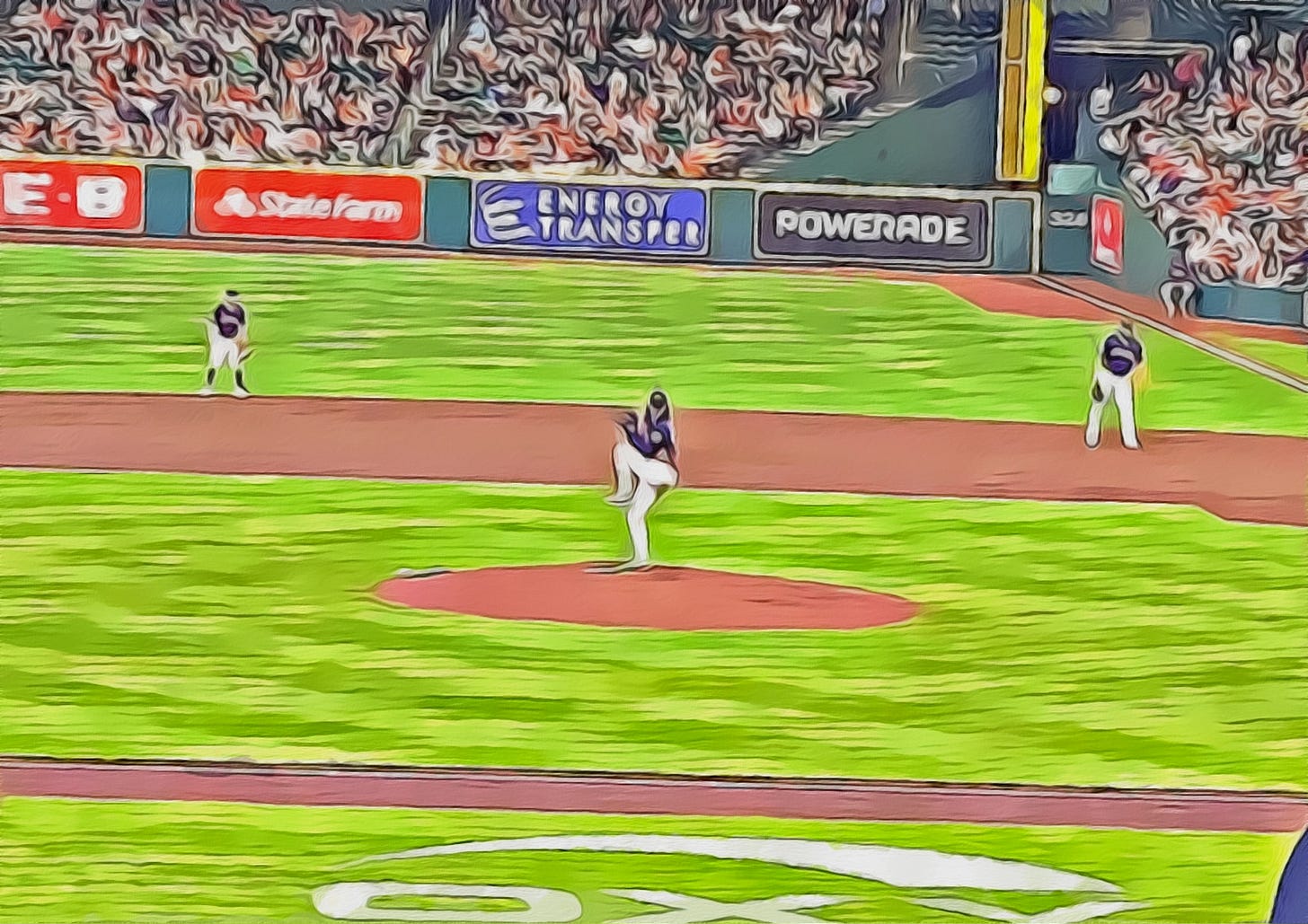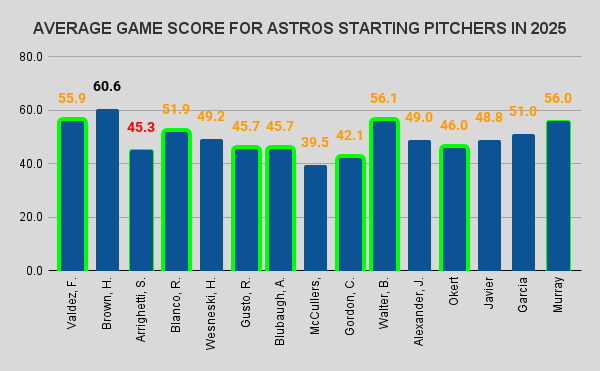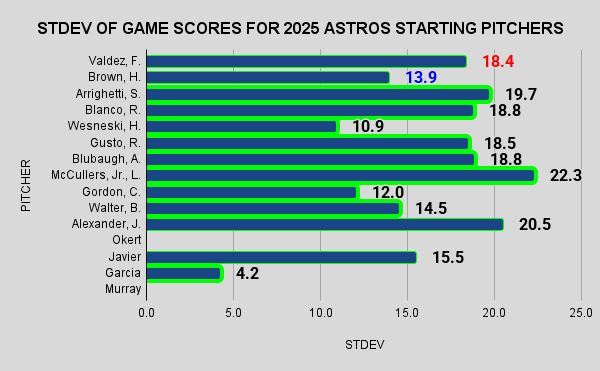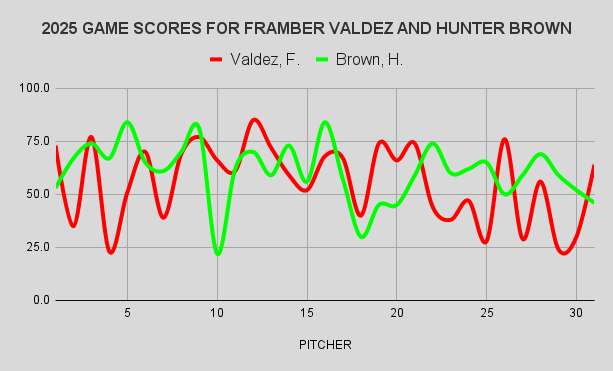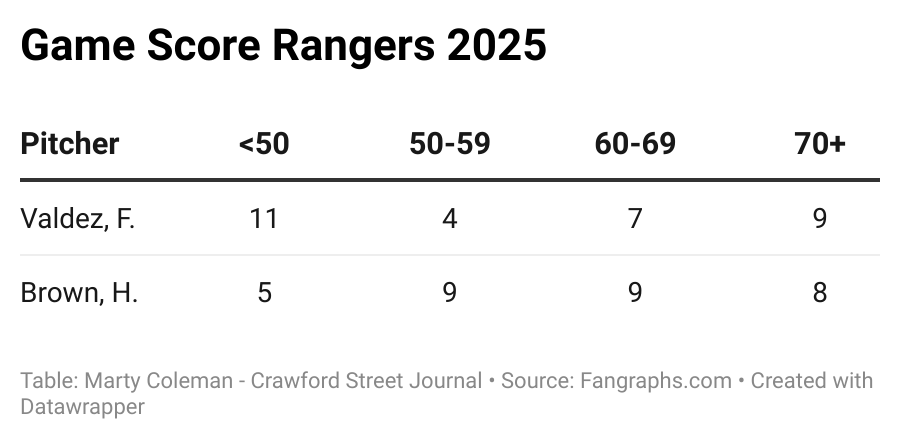Game Scores Reveal an Ace, Potential and Lots of Reasons for Concern
Rarely referenced stat provides insight into the good and bad of Astros' arms
I’m old enough to remember baseball before advanced metrics came into vogue, when we relied a lot on what are now called “counting stats” and box scores to tell us who was good and not good.
We know now that those are perhaps not the best ways to evaluate players, but we also know that just because a pitcher is able to throw hard and has a certain extension, neither is a sure-fire tell of a star or even a replacement-level MLB player for that matter.
I still find value in some of the old-school stats, though not as much as I once did.
One of those stats, that’s rarely if ever quoted these days, is the Game Score for the starting pitcher.
Fangraphs admits that you have to use the stat with nuance:
Game Score tries to answer the fundamental question, “how good was that start?” Its creators and proponents would not argue that Game Score answers the question in a definitive way, but it does a good job separate starts into various tiers.
If you’re a fan who doesn’t think strikeouts, for example, matter, this stat is not likely for you, and that’s OK.
In essence, it’s a benchmark stat, not one that measures the drop of pitches or expected outcomes.
Game Score is best used as a benchmark of individual pitcher performance in a given start. Game Score does not measure true talent directly and is not necessarily predictive of future performance. You should trust Game Score only as much as you trust its components. If you think outs, strikeouts, walks, runs, and home runs are useful statistics for judging a given start, Game Score is a quick way to compare performances. If you prefer to judge performance in other ways, Game Score might not be helpful. Game Score brings more information than wins/losses and quality starts, but less than a full statistical workup of a start.
Game Score Categories
0-10 Unspeakable
10-20 Awful
20-30 Bad
30-40 Poor
40-50 Below Average
50-60 Above Average
60-70 Good
70-80 Great
80-90 Excellent
90+ Make Sure Your Friends Are Watching
Average Game Scores
The Astros starting pitching finished 14th in ERA, 12th in FIP and 9th in fWAR, suggesting an above-average overall performance, despite a year rife with injuries and inconsistency.
Add in their No. 3 finish in xERA and the case for starting pitching not being the problem is buttressed even further.
Even with the injuries and a couple of “openers”, the team averaged a 51.2 Game Score, placing the group “above average”, if only by a small margin.
All things considered, they were serviceable.
What stands out to me is how much better “on average”, Hunter Brown was to Framber Valdez, not only in overall average, but in game-to-game performance as we’ll see shortly.
This chart also points out that Brandon Walter was just as good as Valdez, if only for 9 starts, before his injury.
At the beginning of the year, I made a case against Framber being the Astros’ Ace, depending on which definition was used.
For me, 2025 cemented that thought.
In previous seasons, the highs were higher for Framber, but not so much in 2025, as Hunter developed more consistency.
In over one-third of his starts, Valdez was below average, while Brown was below average in only 16% of his.
Healthy Skepticism Moving Forward
It’s given that Valdez will be moving on as a free agent and now there’s no question who the Astros’ ace is.
I’m skeptical of what remains.
Alexander was good for most of the season, but faded in his last two starts, which cost the Astros down the stretch, and it’s fair to question if he can repeat his performance across a full season.
Who knows the timeline on Hayden Wesneski, Brandon Walter and Ronel Blanco’s returns or if they will be the same.
Perhaps the biggest question is Spencer Arrighetti and his seemingly safe place in the rotation when healthy.
It’s not fair to judge Arrighetti on his 2025 season alone, as his season was interrupted by a freak injury.
But where others see potential, I see someone with a 45.3 average1 Game Score in 2025, which followed a 48 average in 2024.
Arrighetti does have traits the Astros value and I’m not suggesting he won’t become a solid starter, I’m saying it’s something to keep an eye on.
For now, though, the Astros will take a healthy Arrighetti in a heartbeat because the healthy, average or above options are limited.
Other than Brown, the candidates appear to be Alexander, Gordon, Blubaugh, Nate Pearson and what looked like an unpitchable Lance McCullers, Jr.
That group does not inspire confidence.
If this past postseason showed us anything, it’s that young pitchers can contribute - a lot - in some cases, so names like Miguel Ullola, Anderson Brito and Jose Fleury shouldn’t be ignored.
Free agency is upon us and it’s obvious the Astros need to make some moves if they hope to compete in the American League West in 2026.
The Game Score Average in Arrighetti’s profile is 46, but when I add the individual scores and divide by the number of starts, I get 45.3 which is what I used above.


